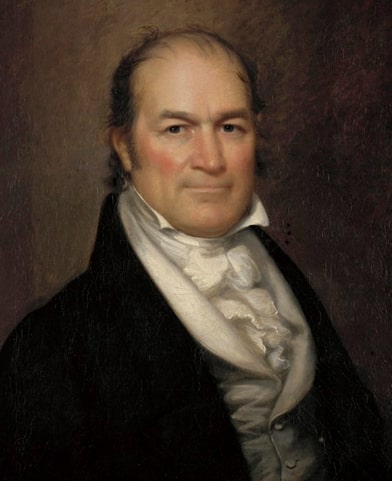William H. Crawford
 William Harris Crawford (February 24, 1772 – September 15, 1834) was an American politician and judge during the early 19th century. He served as US Secretary of War and US Secretary of the Treasury before he ran for US president in the 1824 election.
William Harris Crawford (February 24, 1772 – September 15, 1834) was an American politician and judge during the early 19th century. He served as US Secretary of War and US Secretary of the Treasury before he ran for US president in the 1824 election.Born in Virginia, Crawford moved to Georgia with his parents at a young age, and he grew up to become one of the state’s most popular politicians. After studying law, Crawford won election to the Georgia House of Representatives in 1803. He aligned with the Democratic-Republican Party and US Senator James Jackson. In 1807, the Georgia legislature elected Crawford to the US Senate. After the death of US Vice President George Clinton, Crawford's position as president pro tempore of the US Senate made him first in the presidential line of succession from April 1812 to March 1813. In 1813, US President James Madison appointed Crawford as the minister to France, and Crawford held that post for the remainder of the War of 1812. After the war, Madison appointed him to the position of Secretary of War. In October 1816, Madison chose Crawford for the position of Secretary of the Treasury, and Crawford would remain in that office for the remainder of Madison's presidency and for the duration of James Monroe's presidency.
Although Crawford suffered a severe stroke in 1823, he sought to succeed Monroe at the 1824 election. Because of his roots in Virginia, Crawford received the support of the Virginia dynasty, but ongoing concerns about his health along with a changing political landscape made it impossible for him to become the fourth consecutive Virginia native to hold the office of president. The Democratic-Republican Party splintered into factions, as several others also sought the presidency. No candidate won a majority of the electoral vote and so the US House of Representatives chose the president in a contingent election. Under the terms of the US Constitution, the House selected from the three candidates who received the most electoral votes, which left Andrew Jackson, John Quincy Adams, and Crawford in the running. The House selected Adams, who asked Crawford to remain as Treasury Secretary. Declining Adams's offer, Crawford returned to Georgia and accepted an appointment to the state superior court.
Crawford considered running in the 1832 presidential election for the presidency or the vice presidency but ultimately chose not to when fellow southerner Andrew Jackson sought a second term. Provided by Wikipedia
1
Published 1818
Contributors: ';
“...Crawford, William Harris, 1772-1834....”
Record Source:
Published Materials
Book
2
Published 1824
Contributors: ';
“...Crawford, William Harris, 1772-1834....”
Record Source:
Published Materials
Book
3
Published 1822
Contributors: ';
“...Crawford, William Harris, 1772-1834....”
Record Source:
Published Materials
Book
4
Published 1817
Contributors: ';
“...Crawford, William Harris, 1772-1834....”
Record Source:
Published Materials
Book
5
Published 1823
Contributors: ';
“...Crawford, William Harris, 1772-1834....”
Record Source:
Published Materials
Book
6
Published 1822
Contributors: ';
“...Crawford, William Harris, 1772-1834....”
Record Source:
Published Materials
Book
7
Published 1821
Contributors: ';
“...Crawford, William Harris, 1772-1834....”
Record Source:
Published Materials
Book
8
Published 1823
Contributors: ';
“...Crawford, William Harris, 1772-1834....”
Record Source:
Published Materials
Book
9
Published 1821
Contributors: ';
“...Crawford, William Harris, 1772-1834....”
Record Source:
Published Materials
Book
10
Published 1821
Contributors: ';
“...Crawford, William Harris, 1772-1834....”
Record Source:
Published Materials
Book





